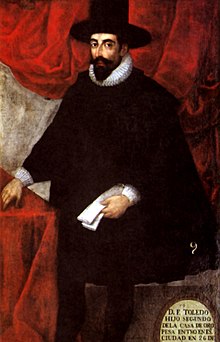Francisco de Toledo
|
Don Francisco Álvarez de Toledo |
|
|---|---|
 |
|
| Viceroy of Peru | |
|
In office November 30, 1569 – May 1, 1581 |
|
| Monarch | Philip II of Spain |
| Preceded by | Lope García de Castro |
| Succeeded by | Martín Enríquez de Almanza |
| Personal details | |
| Born | July 10, 1515 Oropesa, Spain |
| Died | April 21, 1582 (aged 66–67) Escalona, Spain |
| Profession | politician and military |
| Religion | Roman Catholic |
Francisco Álvarez de Toledo (10 July 1515 – 15 August 1582) was an aristocrat and soldier of the Kingdom of Spain and the fifth Viceroy of Peru. He is often considered the "best of Peru's viceroys," albeit controversial for the deleterious impact of some of his actions on the Native American (Indian) population. He brought stability to a tumultuous colony of Spain and enacted administrative reforms which changed the character of Spanish rule and the relationship between the indigenous Native Americans of the Andes and their Spanish overlords. With a policy called reductions, Toledo forcibly relocated much of the Indian population of Peru and Bolivia into new settlements to facilitate Christianization, to collect tribute and taxes, and to gather Indian labor to work in mines and other Spanish enterprises.
Toledo was born in Oropesa. He held the position of viceroy from November 30, 1569, until 1 May 1581, a total of eleven years and five months. He has been praised as the "supreme organizer" of the immense viceroyalty, giving it an adequate legal structure and strengthening important institutions under which the Spanish colony functioned for more than two hundred years. He is criticized for the reductions of the Indian population, expanding the forced labor demanded of the Indians under the mita of the Inca Empire, and executing Túpac Amaru, the last Inca of the Neo-Inca State in Vilcabamba.
He died in Escalona, Spain aged 67.
Francisco de Toledo was born on 15 July 1515 in Oropesa, Castile belonging to the noble family Álvarez de Toledo, while his mother died, which would influence his mood serious and taciturn. Her aunts Mary and Elizabeth were responsible for their upbringing. It was the fourth and last child of II Count of Oropesa, Francisco Álvarez de Toledo y Pacheco and María Figueroa y Toledo, eldest of Gómez Suárez de Figueroa, II Count of Feria and María Álvarez de Toledo, daughter of the I Duke of Alba de Tormes.
...
Wikipedia
